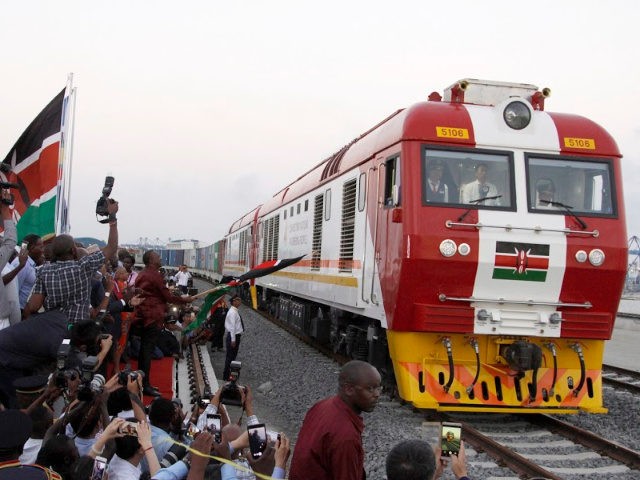A $3 billion railway that Kenya funded with enormous loans from China is making less than half of the revenue required to make payments to Chinese companies that built and now manage the project, the South China Morning Post reported Tuesday.
Confirming America’s concerns that China is using “debt traps” to erode borrower countries’ sovereignty, a leaked copy of the railway contract revealed in December 2018 that Kenya may lose some strategic assets to Beijing if it defaults on its railway project loan.
Kenya reportedly promised Beijing parts of its Mombasa Port as collateral for financing a $3 billion railway the African country built from the port to Nairobi.
Both Beijing and Nairobi denied the report’s claims.
On Tuesday, the Morning Post noted:
Despite the popularity of the new Nairobi-Mombasa line with travelers, critics fear it has come at a heavy price for the country as a whole.
Railway was primarily designed to carry freight, but official statistics suggest revenues generated are not enough to cover fees paid to Chinese companies.
The Morning Post noted that, on top of building and funding the project, known as the Standard Gauge Railway (SGR), China is also managing it.
Breitbart News learned local media have accused the Chinese contractor behind the project of “neo-colonialism, racism, and blatant discrimination” against Kenyan workers.
Statistics from the state-run Kenya Railways Corporation show that the rail project only made $57 million in revenue last year, less than half of the more than $120 million Nairobi pays China annually “in management fees.”
In March, Kenya requested a $740 million loan from the World Bank amid concerns that the African nation is nearing bankruptcy over its rising debt with China. American taxpayers are the largest stakeholders of the World Bank.
The loan request reportedly came after Kenya borrowed $2.1 billion in another Eurobond.
The Morning Post pointed out on Tuesday:
In 2014, when Kenya took a largely commercial US$3.2 billion loan from the Export-Import Bank of China, the goal was to transport freight between the port of Mombasa and Nairobi more efficiently by train, and thus alleviate congestion on the country’s overtaxed and poorly maintained roads.
When measured against its original purpose, the freight service, in fact, has been a big disappointment. Since it launched early last year, the service has consistently failed to deliver enough goods to enable the Mombasa port to pay for itself.The government has had to strong-arm importers to use the train and given deeper discounts to woo more, and even then it has still failed to generate sufficient traffic.
Kenya’s railway project is part of China’s ambitious Belt and Road Initiative (BRI), a massive infrastructure project that aims to link Beijing to the rest of Asia, Europe, Africa, and the Western Hemisphere through a massive network of land and sea routes as well as technology.
U.S. officials have warned that Beijing is using BRI as a vehicle for “predatory” lending practices used to undermine borrower countries’ sovereignty by burying them in unsustainable loans collateralized with strategic assets and natural resources.
Kenya is not the only BRI recipient worried about China seizing its assets for defaulting on its Beijing-owned debt.
Uganda has expressed concerns that Beijing will seize some of its sovereign assets over its rising public debt fueled by BRI.
In Zambia, news reports surfaced that China had taken over the state power company in September 2018 over unpaid debts, a move that Voice of America (VOA) in January noted, “Rippled across Africa, despite government denials.”
Its inability to pay back Chinese loans reportedly forced the South Asian island nation of Sri Lanka to hand over a strategic port to Beijing in 2017.
Nearby Pakistan, considered China’s all-weather ally, is also at risk of losing strategic assets over its debt to Beijing fueled by BRI.
Beijing denies America’s “debt trap” warnings. The United States considers BRI a menace, noting that China can use the projects to expand its ideology, influence, and military.
In October 2018, U.S. President Donald Trump signed a bill into law to revamp America’s investment efforts in Africa to counter “predatory” economic practices across the continent at the hands of China.
Known as the Better Utilization of Investments Leading to Development (BUILD) Act, the legislation is designed to address Beijing’s enhanced economic and political influence in Africa fueled by its BRI project.

COMMENTS
Please let us know if you're having issues with commenting.